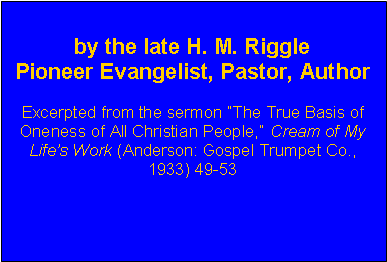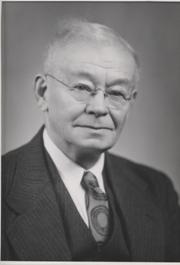|
What is not comprehended in Scriptural Unity:
1. Absolute accord in matters and details of conscience.
2. Always the same mind and opinion in methods and details in the Lord’s work. Paul and Barnabas widely differed along these lines, Acts 15:36-40. James and his congregation at Jerusalem differed with Paul and his co-laborers at Antioch, Acts 15:1, 2. Peter and Paul differed in their manner of procedure, Galatians 2:11-14.
3. It is not an instantaneous, full and complete understanding of all truth the moment the Holy Spirit is received. Nor is it always the ability to clearly comprehend the facts when first presented. It is not infallibility, nor freedom from mistakes. It does not mean perfect uniformity of understanding in every detail and technicality, in every critical analysis.
Christ Himself daily taught His disciples the spiritual nature of His kingdom, and for more than three years drilled them in
this truth, yet they did not understand it. Even after His resurrection they asked Him about the literal restoration of the kingdom of Israel, Acts 1:6. It simply shows how slow they were to fully understand. People today are much the same as then.
The Master on several occasions clearly foretold His death and resurrection, but they did not understand Him. After He was risen He upbraided them because they were so slow to understand and believe. Just before His death He told them, “I have yet many things to say unto you, but ye cannot bear them now” (John 16:12). From this we learn that the revelation of truth to the human mind and heart is gradual.
I want to stress the fact right here that this also was progressive. Jesus gave His apostles a final grand commission to “go into all the world and preach the gospel to every creature among all nations.” Did they fully comprehend the meaning? At least eight years after the day of Pentecost, after Peter had received the Holy Ghost, he would not go and preach to Gentiles until the Lord gave him a vision from heaven (Acts 10). Even then the rest of the brethren at Jerusalem “contended with him” over it, Acts 11:1-17.
Probably thirty years after the Holy Spirit was given, James together with the elders of the church at Jerusalem told Paul to shave his head and purify himself according to the law, for they said, “Thou seest, brother, how many thousands of Jews there are which believe; and they are all zealous of the law.” Paul obeyed the order to assure this Jewish church at Jerusalem that he himself walked orderly and kept the law. Read carefully Acts 21:17-27.
This same Apostle Paul for years before this traveled extensively and planted large churches in different parts of the then known world, and everywhere taught against the observances of Moses’ law. Probably two years before this incident at Jerusalem Paul wrote his Epistle to the Galatians and in that, he severely censured them for allowing law teachers to bewitch them to go back to law observances of Moses’ law. Here is a fact: James the pastor, the elders as a body, and the thousands that made up the church a Jerusalem were strict observers of Moses’ law at least thirty years after the Holy Ghost was given at Pentecost. Other scriptures prove that the apostles such as Peter and John were also at this very time members of this same church. The Holy Spirit had not as yet fully guided them into the liberties of the new covenant.
Irrespective of these differences, fundamentally they were one and there was a sweet unity of the Spirit, a vital relation between the Jewish church at Jerusalem and the Gentile churches with which they were surrounded. So while there was a difference in methods of work, manner of worship, observance of rites, and some were farther advanced in the revelation of truth than others, this did not affect or destroy the unity of the primitive church. Here is a vital point. Now if that was true back there among the apostles themselves and the congregations they planted, can it not be true today?
Unity among the ministry and churches in apostolic days did not consist in strict uniformity along all lines. Ceremonial observances at best, while important and intended to be observed, are but object lessons to teach deeper and richer truth. For example, in Romans 2:26-29, Paul clearly shows that if “the uncircumcision [Gentiles] keep the righteousness of the law . . . . his uncircumcision shall be counted for circumcision.” A real Jew, and real circumcision as God views it, is not “outward in the flesh,” but “inwardly,” “of the heart, in the spirit.” The same idea is expressed in Galatians 5:15, “For in Christ Jesus neither circumcision availeth anything, nor uncircumcision, but a new creature.” That’s what counts. Without that, oneness is an empty dream.
What is comprehended in Scriptural oneness and its true basis:
Christ alone is the true and only basis of unity: “All one in Christ Jesus,” Galatians 3:28. This is exactly the ground occupied by the early church, and by taking the same position we stand identical. All Christians on earth can unite in Christ. Paul says in Ephesians 1:10, “that he might gather in one all things in Christ.” Only by recognizing all saved people everywhere as our brethren in the Lord and members of the same universal family, extending to them our warmest Christian love and fellowship, and placing no human barriers between us and them, can we steer clear of the sin of division.
Abide in Christ only and we are one, as Jesus expressed it in His prayer, “that they may be one in us.” That is the secret. One thing that holds good people away from this sweet fellowship and visible unity is the denominational walls that have been built up. Obliterate these and a great forward step has been taken towards universal oneness in Christ.
Brethren, this must be our attitude. If we put up any unscriptural walls and barriers of our own between ourselves and other Christians, we become sectarian; but by abiding only in Christ and holding all Christians everywhere as our brethren in the Lord and extending to them the warmest Christian love and fellowship; and yet valiantly and loyally standing for every principle of truth and the visible unity of God’s people and declaring this in all boldness and with all authority, will, I believe, bring about the gathering together in one of all those who are in Christ Jesus.
There is a true basis of unity and work, the only basis upon which all God’s people can unite. It is not a gathering to any one particular body as a group, for such a gathering will not restore the truth, nor the church, to primitive conditions. Our gathering must be to Christ—“All one in him.” “To him shall the gathering of the people be.” Jesus Christ must be the hub and center of our work. His life, power, and Spirit must permeate the entire body. Without this any movement is a failure.
I frequently meet good, sincere Christians whom I believe are theoretically wrong, but sincere and right at heart. Frankly, I find some of them in the visible movement and work in which I am identified. Now, if we can bear the differences of opinion of our own brethren who are visibly identified with us, as long as those differences do not involve fundamental and vital principles of truth, and we bear and forbear in love, and overlook and excuse their weaknesses, faults, and failings, and still fellowship and work with them; then, brother, in all candor I humbly ask, why can we not do the same with all true Christians and show the same love and forbearance toward them?
Right here is the vital test as to whether we ourselves are sectarian and have more the spirit of a mere movement idea than the Christ spirit and Christ love which only can produce Bible oneness. Can we not preach the truth and the distinct message God has committed to us without becoming sectish about it?
Upon the rock of faith the church has firmly stood Through storm and flood, ‘mid fire and death, a bulwark of the good.
--Edgerton Grant
|


